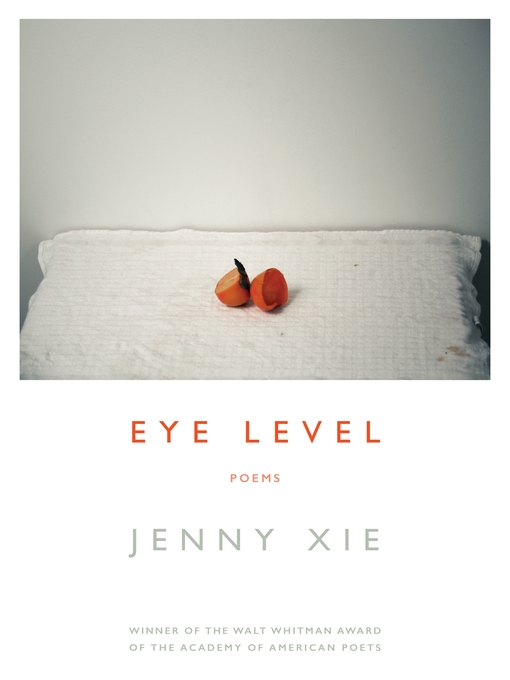FINALIST FOR THE NATIONAL BOOK AWARD FOR POETRY
Winner of the Walt Whitman Award of the Academy of American Poets, selected by Juan Felipe Herrera
For years now, I've been using the wrong palette.
Each year with its itchy blue, as the bruise of solitude reaches its expiration date.
Planes and buses, guesthouse to guesthouse.
I've gotten to where I am by dint of my poor eyesight,
my overreactive motion sickness.
9 p.m., Hanoi's Old Quarter: duck porridge and plum wine.
Voices outside the door come to a soft boil.
—from "Phnom Penh Diptych: Dry Season"
Jenny Xie's award-winning debut, Eye Level, takes us far and near, to Phnom Penh, Corfu, Hanoi, New York, and elsewhere, as we travel closer and closer to the acutely felt solitude that centers this searching, moving collection. Animated by a restless inner questioning, these poems meditate on the forces that moor the self and set it in motion, from immigration to travel to estranging losses and departures. The sensual worlds here—colors, smells, tastes, and changing landscapes—bring to life questions about the self as seer and the self as seen. As Xie writes, "Me? I'm just here in my traveler's clothes, trying on each passing town for size." Her taut, elusive poems exult in a life simultaneously crowded and quiet, caught in between things and places, and never quite entirely at home. Xie is a poet of extraordinary perception—both to the tangible world and to "all that is untouchable as far as the eye can reach."
- Mental Health Matters
- Available Now
- Addiction & Recovery
- A*D*R*E*N*A*L*I*N*E!!
- Agriculture & Nutrition: Food for Our Table
- All About Money - Yours, Theirs, Ours
- All About Ukraine
- Alzheimer's, Dementia & the Brain as You Age
- Art of the Culinary Variety
- Babies & Beginnings
- Baked for the Holidays
- Be a Citizen Scientist!
- Better with a Sweater: Crafts, Cookbooks & Cozy Reads
- See all ebooks collections
- Preparing for Emergencies
- Available Now
- Addiction & Recovery
- A*D*R*E*N*A*L*I*N*E!!
- Agriculture & Nutrition: Food for Our Table
- All About Money - Yours, Theirs, Ours
- Alzheimer's, Dementia & the Brain as You Age
- Art of the Culinary Variety
- Babies & Beginnings
- Better with a Sweater: Crafts, Cookbooks & Cozy Reads
- Body Positivity for EveryBODY
- The Case of the Checked-Out Mystery
- Dark Academia
- See all audiobooks collections


